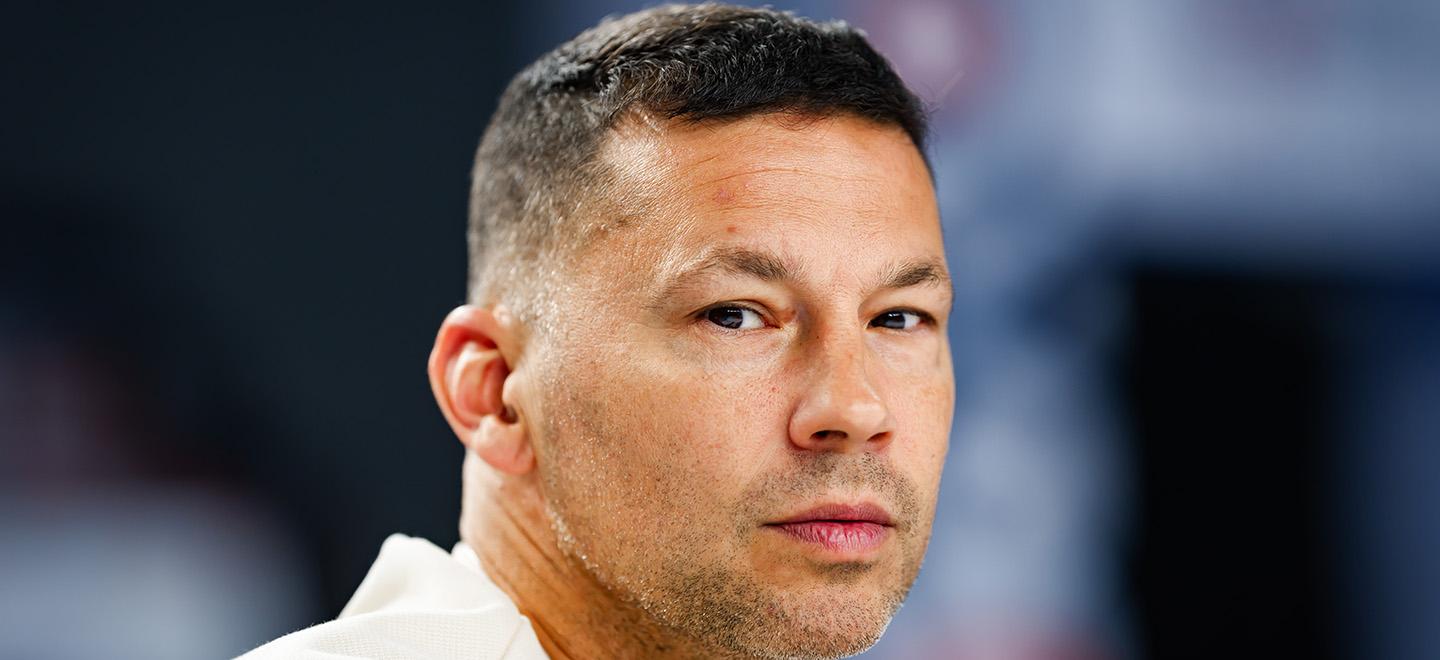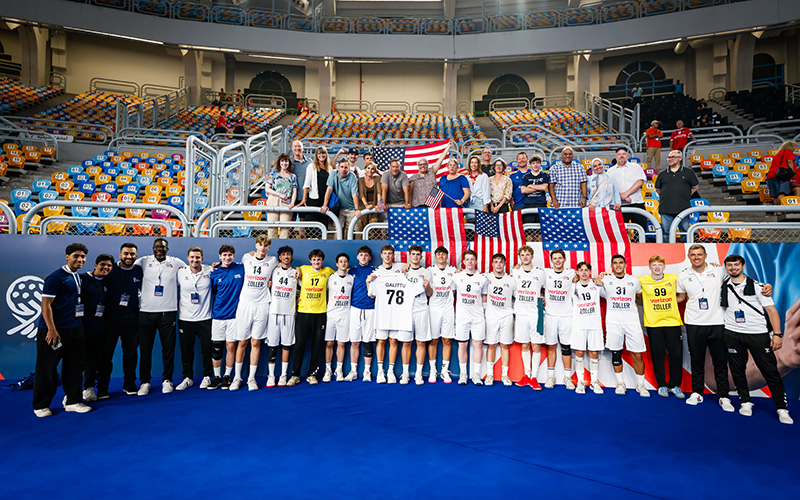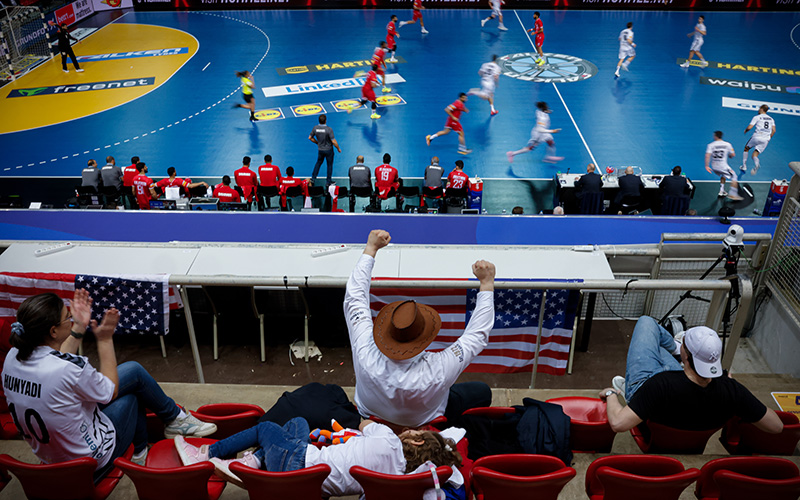News
New USA coach Ortega's motto for growing handball: "Relationships are key"
11 Sep. 2025

With less than three years to go before the start of the Los Angeles 2028 Olympic Games, the United States of America men’s handball team has undergone a swift makeup, after coach Robert Hedin handed in his resignation after a seven-year stint leading the American team.
Under his stewardship, the USA secured its maiden win at the IHF Men’s World Championship, in 2023, and improved their tally to five overall wins after the 2025 edition of the world handball flagship competition.
In came Mark Ortega, a former assistant for the USA national team between 2015 and 2022 and a former player between 2004 and 2014, with stints as a captain. A lifelong handball advocate with deep personal ties to the military and a global perspective shaped by years of playing and coaching internationally, Ortega brings a clear vision and unwavering commitment to fostering growth at all levels.
IHF.info tried to pick Ortega’s mind aboutthe pathways for nurturing homegrown and international talent, and the immense potential he sees leading up to the LA 2028 Olympic Games.
Ortega’s focus on building strong relationships, creating worldwide development pipelines, and cultivating a winning culture underpins his strategy to elevate USA Handball on the global stage.
“The USA team is a part of me and it means a lot to be now in this position. Representing the country is part of my life. You know, God, duty, country, all of these are important for me, because my father was in the military, my grandfather was in the military so it is just part of me, part of my life,” says Ortega.
“There have been many times when representing the country, representing USA have brought tears to my eyes. As a player, as a coach, every time you hear the national anthem, it is something special.”
Ortega’s life has been intertwined with sports. He was a gymnast between six and 16 years old. Then he dipped his toes into american football, during college, playing as a wide receiver for Kent State University and Malone College. But when he found handball, after college, he learnt handball from a former Romanian Olympian, Cristian Zaharia, in Florida.
And it stayed with him ever since.

Photo credit: KRAS/Volendam
“Handball is really about personal relationships. And when you have a good personal relationship, it reflects pretty quickly in the handball world. I think over the last 20 years, I have built a vast network of relationships through my career and in the countries I have played in. Therefore, as everything was a challenge, this is a new challenge, but one that I am really prepared for,” says Ortega.
“Being the USA coach is something I have worked for my entire career, my entire life. It is 22 years of work around the clock to be here and to finally apply the things I have seen while I grew.”
As a player, Ortega came from a humble beginning. While working with coach Zaharia in Miami, he was also a real estate agent. Then he decided handball is his passion and he wanted to become an Olympian. He spent a few weeks in Europe, in training stages at Romanian club Dinamo București and at Paris Saint-Germain.
He then continued to pursue his dream and played in Santander, in the Spanish lower leagues, then in Norway, at Alta IF, in the second league, then in Germany, as well as in Egypt, before metting an end to his playing career and transition to a coach.
But enough about the past. What about the present?
Ortega has a big challenge on his hands. With the United States of America still included in the New Markets’ programme of the IHF, which offers assistance to emerging countries, the new coach has to build upon the current base of the pyramid and improve the conditions for the national team.
“No coach is going to say they expect to go backwards. For me, moving forward is the only option. In doing so, we have been heavily focused on developing handball players who are already in Europe. However, there are actually many different pathways we need to pay attention to. Instead of concentrating on just one pathway, I plan to focus on three or four, giving them all proper attention. The goal is to build bridges between the United States and Europe, creating a worldwide system. That would be the biggest achievement—establishing a global pathway for handball players from the USA. This includes Americans already playing in Europe but also those who are competing in the U.S. and talented athletes who may not yet be recognised,” says Ortega.

Easier said than done, but there is a plan in motion.
“Everyone knows there are incredible athletes in the U.S., but the challenge is how to integrate them into the global handball pipeline. That is essentially my focus: looking at the whole world, not just the players currently competing between the fourth, fifth, and second leagues in Europe. These players are spread across countries like Hungary, Sweden, Poland, and Germany, all over Europe, learning the fundamentals and basics of handball. So yes, that is the approach and the vision I have moving forward,” adds the new USA coach.
Indeed, the United States of America have become a constant presence in the younger age category competitions on the world stage. The USA men's national junior handball team was present at the last three editions of the IHF Men’s Junior World Championship, finishing 22nd in 2019, 27th in 2023 and 25th in 2025.
At the IHF Men’s Youth World Championship, USA finished 28th in their debut at Croatia 2023 and 31st at Egypt 2025.
“My main roles are as the men’s national team coach and as the Director of the program for juniors, youth, and cadets. My priority is to figure out how to make those teams strong and competitive, especially for big stages like the Olympic Games. Representing the USA well on the global stage is key, and I believe this focus will play a huge role in growing handball in the country. That’s my part and responsibility right now,” says Ortega.
The LA 2028 Olympic Games are less than three years away and both the USA men’s and the women’s national teams are qualified as hosts. That brings a huge responsibility and a great chance to improve handball, just as a boom was recorded after Atlanta 1996.
“To give an example, the Olympics happen every four years. Recently, we have an athlete intake form on the USA Team Handball website where people interested in handball can sign up. Over the course of a year, we might see about a hundred people fill out that form. However, during the seven or eight days when NBC or Peacock broadcasts the Olympics in the United States, the number jumps to over a thousand people,” adds Ortega.
“Now that the 2028 Olympics will be held in Los Angeles, this provides a huge boost for handball’s visibility in the U.S., especially during the Olympic Games. How USA Team Handball can capitalise on that excitement remains to be seen, but I understand that recruiting requires a very personal approach. Building strong relationships city by city is essential—whether that’s in Los Angeles, New York City, clubs like the California Eagles or Cal Heat, or states like Texas, Maryland, and Ohio. If I can make an impact with even one relationship in a city, it creates a ripple effect.”
“I am focused on building a connected staff and network that stretches throughout the United States and Europe, creating a broad web to support handball’s growth in the USA.”

Ortega has plenty of experience as a coach, having also acted as the head coach of Dutch side KRAS/Volendam. That stint helped him evolve even more and add more layers of experience to an already well-versed coach.
“When I was a player, I kept books from every coach—notes taken after practice, recording mistakes I made or things I did well. I kept detailed evidence of everything. I wrote down many different things from my perspective as a player, reflecting on what I might have done differently or how I could improve. I never really dreamed about coaching specifically because I just felt that one day the situation would naturally arise—whether it was if or when I’d become a coach or face certain challenges. Honestly, I feel like I’ve been preparing for this for over 20 years. I’ve been part of the U.S. team for more than two decades and have held many leadership positions and different roles along the way. It just feels like I’ve been doing this for a long time, so in many ways, I was ready; everything was already set up for me. I don’t know if you can really explain it any other way,” adds Ortega.
The past and present have been covered. But what about the future? How confident is Ortega that he can provide the much-needed impetus to boost USA’s chances for success?
“The objective is clear. The good thing is we have a well-defined series of stepping stones between now and the Olympics. We start with a continental qualifier, then move on to a qualifier for the Pan American Games. Following that, we have the World Championships and the Pan American Games the year after, leading up to the Olympics. These stepping stones provide a structured pathway all the way to the Olympics. The important thing is that we show growth at each stage, so by the time we reach the Olympic Games, the progress is obvious. I don’t want it to come as a surprise that we suddenly have good results—like, how did that happen? Instead, I want to see a clear and steady progression from NORCA to the Pan American Games and then to the World Championships,” says Ortega.
His current job is more than being just a coach, it is also about fundraising, building a blueprint and even selecting the top players via different pipelines for the future. But Ortega’s main takeaway after so many years in handball is clear.
“Relationships are key. I cannot emphasise that enough.”

